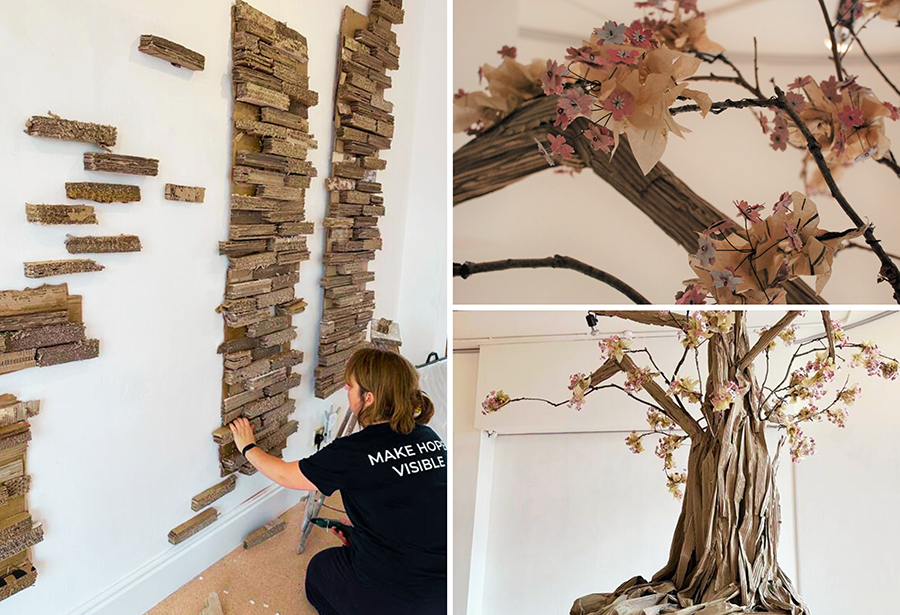When English artist Victoria Culf engaged in a friendly conversation last June, she never thought her life was about to be turned upside down.
With degrees in both fine arts and art psychotherapy, Victoria makes her living as an artist. She produces woven wall art and nature-inspired sculptural displays for festivals and other events. She organizes arts and crafts workshops for children and adults, and she is often employed for community-based art projects.
She came to Christ more than 20 years ago, when a friend who had been witnessing to her throughout college brought her to church. There, after years of rebuffing her friend’s evangelistic efforts, Victoria finally responded to the Good News of Christ.
Last June, while setting up an exhibition of her art at the Watford Museum, a few miles northwest of London, she was in a break room making a cup of tea when a museum employee walked in.
The conversation turned personal as the woman began to share that her child was transitioning to a different gender. She affirmed her child’s desire to transition, and she said the family had gotten lots of encouragement from others.
As politely as she could, Victoria said that because of her Christian beliefs and her experience working with children and young people, she believed that such transitioning is harmful.
People in the U.K. can’t even legally obtain a tattoo until they turn 18, she said, so why would parents rush their child into other irreversible procedures, such as puberty blockers?
The conversation remained amicable, and Victoria believed that the two had simply agreed to differ on the issue.
But later that day, the woman shared an angry social media post, saying she had been subjected to a transphobic rant. The Watford Borough Council, which oversees the museum, told Victoria there were allegations of harassment, and she would need to give 24 hours’ notice before coming to her own art exhibition so the staff could “safeguard” the employee. They also said the police were investigating her and that she would need to prepare a statement. Subsequently, she discovered that some of the pieces in her exhibition were broken.
And the hits kept coming.
“I’ve had work canceled,” Victoria told Decision. “I’ve had work put on hold. Schools are nervous about having me in because I’m controversial. I’ve lost a lot of income.”

But she is not about to back down.
“At first, what happened really knocked my confidence and made me doubt myself,” she said. “But my faith has kept me going, and I cannot waver from what I know to be the truth. I am determined to fight for justice and to speak about what has happened to me.”
She points to multiple reasons for opposing the transgender movement’s agenda for children: People often change their minds and wish they had made different decisions while growing up; human brains do not stop developing until about age 24; and many people who have undergone gender-change procedures during childhood regret their decision later.
But at the root, Victoria sees something much deeper: “It feels like a spiritual assault on children’s innocence,” she says. “As a Christian, I think it’s the spirit of Baal, offering up our children. In Biblical times, they called it making them eunuchs; now they call it a mastectomy or a gonadectomy. It’s the same spirit, just a new name.
“If you’re a discerning Christian, you cannot agree with this. I think anyone sitting on the fence needs to get off of it. God—who knit you together in your mother’s womb, who wrote you on the palm of His hand before you were born and created humans as male and female—doesn’t make mistakes.”
Victoria is taking legal action against the Watford Borough Council. She is seeking damages, a written formal apology and a lifting of restrictions on her going to the museum. She also wants a retraction of the allegations against her to be given to all parties, and a commitment by the council that nothing like this will happen again.
But the legal battle won’t be quick. “I’ve been told it could go on for years,” she says. Ironically, in March, England’s National Health Service (NHS) announced a ban on puberty blockers for children, saying, “There is not enough evidence to support the safety or clinical effectiveness of puberty-suppressing hormones to make the treatment routinely available at this time.” And in April, an independent review commissioned by the NHS cited the “poor quality” of many of the published studies in the field and said the evidence is weak when it comes to support for early puberty suppression.
In the meantime, Victoria is dealing with the loss of professional opportunities, as well as the pressures that have come from her case.
“Honestly, I don’t know where my life’s going,” she said. “I’m in the trudge, plodding with one foot in front of the other, in faith.”
Asked how Decision readers can best encourage her, she replied: “Praying for me would be really lovely, just knowing that people out there feel the same way. Praying unites us. Pray for me, for the situation and for the family of the woman I spoke to at the museum, that they would be healed and come to know the Lord. And pray for the situation in the U.K. because Christians are losing jobs here.” ©2024 BGEA
Photo: Courtesy of Victoria Culf
